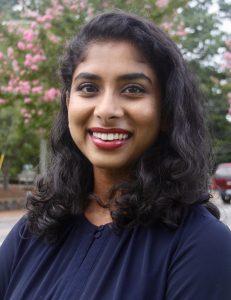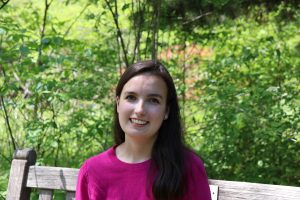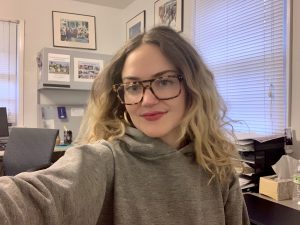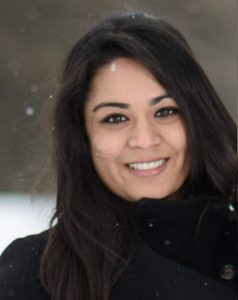SMITA MISRA
 Smita Misra is a graduate fellow at the Humanities Futures (HF) Initiative of Humanities for the Public Good (HPG). The HF Initiative is focused on developing the advocacy and engagement skills of undergraduates. In her facilitation, Smita highlights the collaborative, invitational, and political possibilities of humanities interventions. She mentors students in their investigations of trans activism in Durham; climate change emigration in rural North Carolina; and online Chinese counterpublics during the coronavirus epidemic, to name a few. Working alongside Robyn Schroeder and Michelle Padley, Smita teaches value communication, proposal writing, project design, budgeting, ethical implementation, and evaluation methods. Equipping undergraduates with practical project experience, Humanities Futures empowers students to ask questions, critique, collaborate, and innovate in a fraught 21st century.
Smita Misra is a graduate fellow at the Humanities Futures (HF) Initiative of Humanities for the Public Good (HPG). The HF Initiative is focused on developing the advocacy and engagement skills of undergraduates. In her facilitation, Smita highlights the collaborative, invitational, and political possibilities of humanities interventions. She mentors students in their investigations of trans activism in Durham; climate change emigration in rural North Carolina; and online Chinese counterpublics during the coronavirus epidemic, to name a few. Working alongside Robyn Schroeder and Michelle Padley, Smita teaches value communication, proposal writing, project design, budgeting, ethical implementation, and evaluation methods. Equipping undergraduates with practical project experience, Humanities Futures empowers students to ask questions, critique, collaborate, and innovate in a fraught 21st century.
JANE McGRAIL
 As a recipient of a Humanities for the Public Good fellowship, Jane McGrail has worked with Carolina K-12 to contribute to the public good by helping to make university resources available to public educators throughout the state. In her capacity as a Humanities for the Public Good fellow, Jane has designed curricular materials to be featured in Carolina K-12’s open-access, online textbook, ANCHOR, that seek to make moments in North Carolina history relevant and accessible to high school students today. The lesson plans she has written are designed to maximize student engagement. They cover topics such as the Salisbury Bread Riot of 1863, North Carolina women’s suffrage movements, and Ella May Wiggins and songwriting as resistance during the Loray Mill Strike in Gastonia in 1929. Jane’s work on this project has prioritized the history of women’s resistance movements in North Carolina history to help spread the stories of North Carolina’s little-known heroes.
As a recipient of a Humanities for the Public Good fellowship, Jane McGrail has worked with Carolina K-12 to contribute to the public good by helping to make university resources available to public educators throughout the state. In her capacity as a Humanities for the Public Good fellow, Jane has designed curricular materials to be featured in Carolina K-12’s open-access, online textbook, ANCHOR, that seek to make moments in North Carolina history relevant and accessible to high school students today. The lesson plans she has written are designed to maximize student engagement. They cover topics such as the Salisbury Bread Riot of 1863, North Carolina women’s suffrage movements, and Ella May Wiggins and songwriting as resistance during the Loray Mill Strike in Gastonia in 1929. Jane’s work on this project has prioritized the history of women’s resistance movements in North Carolina history to help spread the stories of North Carolina’s little-known heroes.
DANIELLE DULKEN
 Danielle Dulken is a PhD Candidate in the Department of American Studies and the HPG fellow for the Marian Cheek Jackson Center (2018-2019, 2019-2020). An oral historian, Danielle has worked with students at UNC-Chapel Hill to develop the Jackson Center’s Oral History Trust, recorded community histories at annual events like the annual Northside Festival, co-led oral history workshops to support a neighbor-to-neighbor oral history initiative, and is currently processing archival research to help produce an exhibition on the history of Northside teachers, entrepreneurs, and artists opening summer 2020. At the Jackson Center, Danielle’s learns from a team of integral, local advocates who steer the Jackson’s Centers major projects and events. In this way, the public determines how her skill-set can support their needs. This shifts Danielle’s academic work away from the idealized model of scholarly expression and toward a model of public humanities wherein the benefactors range from students to the Jackson’s Center’s staff to the people of Northside, Tin Top, Pine Knolls, and beyond. The relationship is symbiotic and while Danielle’s work at the Jackson Center follows their commitments to local residents, she too has gained an important perspective on the possibilities of academic training for a public good.
Danielle Dulken is a PhD Candidate in the Department of American Studies and the HPG fellow for the Marian Cheek Jackson Center (2018-2019, 2019-2020). An oral historian, Danielle has worked with students at UNC-Chapel Hill to develop the Jackson Center’s Oral History Trust, recorded community histories at annual events like the annual Northside Festival, co-led oral history workshops to support a neighbor-to-neighbor oral history initiative, and is currently processing archival research to help produce an exhibition on the history of Northside teachers, entrepreneurs, and artists opening summer 2020. At the Jackson Center, Danielle’s learns from a team of integral, local advocates who steer the Jackson’s Centers major projects and events. In this way, the public determines how her skill-set can support their needs. This shifts Danielle’s academic work away from the idealized model of scholarly expression and toward a model of public humanities wherein the benefactors range from students to the Jackson’s Center’s staff to the people of Northside, Tin Top, Pine Knolls, and beyond. The relationship is symbiotic and while Danielle’s work at the Jackson Center follows their commitments to local residents, she too has gained an important perspective on the possibilities of academic training for a public good.
SAMAH CHOUDHURY
 The Carolina Public Humanities (CPH) Strategic Collaboration Fellowship allowed Samah Coudhury to work with two different divisions in CPH: the Humanities on the Road Initiative and the Maynard Adams Fellows. Here, she learned first-hand how highly interpersonal the work of public humanities is: From collaborating on grant proposals, to bringing in local professionals and non-profits for their expertise on a given topic, Samah believes that the public good is served best when we work transparently and collectively. She has helped organize community events on ethical meat consumption, the local histories of western North Carolina, and even the National High School Ethics Bowl for high school students. Samah witnessed that the labor required to make such a breadth of accessible programming possible (and for the most part, free!) means devoting a considerable amount of time to development-type work. The combination of collaborative interpersonal work coupled with administrative duties helped her build skills that she will continue to apply both in the academy, and in her public scholarship.
The Carolina Public Humanities (CPH) Strategic Collaboration Fellowship allowed Samah Coudhury to work with two different divisions in CPH: the Humanities on the Road Initiative and the Maynard Adams Fellows. Here, she learned first-hand how highly interpersonal the work of public humanities is: From collaborating on grant proposals, to bringing in local professionals and non-profits for their expertise on a given topic, Samah believes that the public good is served best when we work transparently and collectively. She has helped organize community events on ethical meat consumption, the local histories of western North Carolina, and even the National High School Ethics Bowl for high school students. Samah witnessed that the labor required to make such a breadth of accessible programming possible (and for the most part, free!) means devoting a considerable amount of time to development-type work. The combination of collaborative interpersonal work coupled with administrative duties helped her build skills that she will continue to apply both in the academy, and in her public scholarship.
EMMA ROTHBERG
Emma Rothberg is a PhD Candidate in the History Department working with Historic Stagville in Durham, NC. As a Fellow, she is working to help Stagville staff create digital content for outreach purposes. Her main project is writing text for an online exhibit that will show the intimate connections between Stagville and its people to the early history of the City of Durham. Other projects include helping Stagville staff identify and use digital resources for creating supplemental materials, such as maps and timelines, and digitally analyzing Stagville’s primary sources. While Historic Stagville is only about twenty minutes from downtown Durham, many people do not know it exists and therefore miss out on the important story the site has to tell about the history of slavery, capitalism, and resistance in North Carolina and the Untied States. It is the hope that this new digital content will help Stagville reach new audiences as well as get more people to come visit the site. By expanding the reach of Historic Stagville and its important educational mission, Emma hopes to contribute to the public good with this fellowship.
